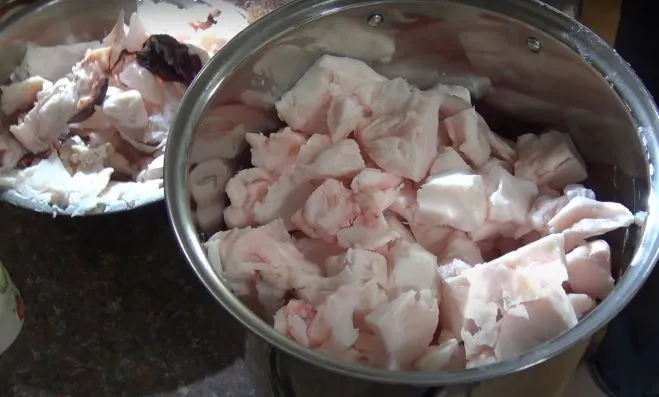Pop Tarts have graced breakfast tables for generations, becoming a beloved morning ritual.
However, for those with dietary restrictions or specific religious beliefs, the potential presence of pork-derived ingredients, especially gelatin, is a cause for concern.
In this detailed guide, we aim to address the burning question: “Does Pop-Tarts have pork?” We’ll delve into the ingredients, potential sources of pork, and provide practical tips for those navigating this dietary consideration.

Table of Contents
Does Pop Tarts Have Pork?
Yes, some Pop Tarts products contain gelatin, which can be made from pork. Gelatin is a common ingredient used in many food products, including certain varieties of Pop-Tarts.
It is derived from collagen, a protein found in the skin, bones, and connective tissues of animals. Depending on the manufacturer’s practices, gelatin in Pop-Tarts can be sourced from either pork or beef.
Read: Does Doritos Have Pork In It?
Understanding Gelatin in Pop-Tarts:
Gelatin is a versatile ingredient used in various food products, including specific varieties of Pop-Tarts.
It is derived from collagen, a protein found in the skin, bones, and connective tissues of animals. This protein is extracted through a meticulous process that involves simmering these animal parts.
In the context of Pop-Tarts, gelatin serves several essential functions:
- Texture and Consistency: Gelatin provides a unique texture, contributing to the chewiness or elasticity of certain fillings or coatings in Pop-Tarts. This is particularly noticeable in flavors with gooey centers.
- Gelling Agent: Gelatin has the remarkable ability to form a gel-like structure when mixed with liquid. This characteristic is beneficial for creating the desired consistency in various components of the pastry.
- Stabilizer: It helps maintain the structural integrity of fillings and coatings, preventing them from becoming too runny or collapsing.
- Binding Agent: Gelatin can act as a binding agent, holding together different ingredients in the filling, especially when dealing with semi-solid or viscous components.
It’s essential to be aware that gelatin can be sourced from different animals, including both pork and beef.
Therefore, for individuals with specific dietary restrictions or religious beliefs, understanding the source of gelatin in Pop-Tarts becomes crucial.
When inspecting the ingredient list of a Pop-Tarts package, keep an eye out for the term “gelatin.” If listed, further inquiry may be needed to ascertain whether it is derived from pork or beef.
This knowledge empowers consumers to make informed decisions based on their dietary preferences and restrictions.
Read: Is Pork Fat Bad For Your Heart?
Pop-Tarts ingredients
The ingredients in Pop-Tarts vary depending on the flavor, but most flavors contain the following:
- Enriched flour (wheat flour, niacin, reduced iron, vitamin B1 [thiamin mononitrate], vitamin B2 [riboflavin], folic acid)
- Sugar
- Corn syrup
- High fructose corn syrup
- Dextrose
- Soybean and palm oil (with TBHQ for freshness)
- Bleached wheat flour
- Wheat starch
- Salt
- Leavening (baking soda, sodium acid pyrophosphate, monocalcium phosphate)
- Citric acid
- Dried fruits (specific to the flavor)
- Modified wheat starch
- Gelatin (in some flavors)
- Caramel color (in some flavors)
- Xanthan gum (in some flavors)
- Soy lecithin (in some flavors)
- Artificial and natural flavors (specific to the flavor)
- Colors (specific to the flavor)
Some Pop-Tart flavors also contain additional ingredients, such as marshmallows, chocolate chips, or nuts.
It is important to note that the ingredients in Pop-Tarts can vary depending on the country where they are sold.
For example, Pop-Tarts sold in the United Kingdom may have different ingredients than Pop-Tarts sold in the United States.
If you have any questions about the ingredients in a specific Pop-Tarts flavor, you can check the ingredients list on the package or contact Kellogg’s customer service.
Read: What Happens If You Eat Pork Fat?
Pork-Free Pop-Tarts: What to Look For
For individuals seeking Pop-Tarts without pork-derived ingredients, there are several effective strategies to consider.
These approaches help in making informed choices that align with specific dietary preferences and restrictions:
- Unfrosted and Natural Flavors: Opt for Pop-Tarts labeled as “unfrosted” or “natural.” These varieties are more likely to be free of gelatin, as they often rely on alternative ingredients for texture and flavor. This option provides a straightforward way to avoid pork-derived additives.
- Ingredient List Scrutiny: Thoroughly examine the ingredients list on the packaging. Look for the presence of gelatin and any other animal-derived components. Manufacturers are required to disclose all ingredients, offering transparency and enabling consumers to make informed decisions.
- Contacting Kellogg’s Customer Service: When uncertainty persists, don’t hesitate to reach out to Kellogg’s customer service. They can provide specific information about the sourcing of gelatin in particular flavors. This direct communication ensures clarity and assists consumers in choosing products that align with their dietary needs.
By employing these strategies, individuals can confidently select Pop-Tarts that meet their specific dietary preferences, including those who wish to avoid pork-derived ingredients.
These proactive steps empower consumers to enjoy their favorite breakfast treat without compromising their dietary requirements.
Read: Do Marshmallows Have Pork?
Which Pop-Tarts Contain Gelatin?
Not all Pop-Tarts contain gelatin. It’s essential to be aware of which flavors do and which do not contain this ingredient.
Below, we’ll outline the specific flavors that are made without gelatin:
- Strawberry
- Brown Sugar Cinnamon
- Blueberry
- S’mores
- Frosted Wildberry
- Frosted Cherry
- Frosted Grape
- Frosted Apple
- Frosted Strawberry Milkshake
- Frosted Brown Sugar Cinnamon Roll
- Frosted Pop-Tarts Bites in Strawberry and Brown Sugar Cinnamon
These flavors provide a suitable option for individuals who prefer to avoid gelatin in their Pop-Tarts.
However, it’s crucial to note that there are certain flavors that do contain gelatin, and some of these are derived from pork.
Which Pop-Tarts Contain Pork Gelatin?
While the majority of Pop-Tarts do not contain gelatin, there are specific flavors that include it, and in some cases, it may be derived from pork.
The following Pop-Tarts varieties are known to contain gelatin sourced from pork:
- Frosted Pop-Tarts with Marshmallows
- Frosted Pop-Tarts Bites with Marshmallows
- Kellogg’s Rice Krispies Treats Mini-Squares
Understanding which flavors may contain pork-derived gelatin is crucial for those with dietary restrictions or specific religious beliefs. This knowledge empowers individuals to make informed choices about their food consumption. If you’re uncertain whether your Pop-Tarts contain pork gelatin, checking the ingredients list is the most reliable way to confirm. Additionally, contacting Kellogg’s customer service can provide further clarification.
How to Tell if Your Pop-Tarts Contain Pork Gelatin

Determining whether your Pop-Tarts contain pork-derived gelatin is a straightforward process. Here’s a step-by-step guide:
- Check the Ingredients List: Start by examining the packaging of your Pop-Tarts. Look for the list of ingredients. Gelatin will be clearly listed if it’s present. Pay close attention to this section, as it will also specify whether the gelatin is derived from beef, pork, or both.
- Look for Specific Flavors: As mentioned earlier, certain flavors of Pop-Tarts are known to contain gelatin, and in some cases, it may be sourced from pork. The flavors to be particularly cautious of include:
- Frosted Pop-Tarts with MarshmallowsFrosted Pop-Tarts Bites with MarshmallowsKellogg’s Rice Krispies Treats Mini-Squares
- Contact Kellogg’s Customer Service: If after checking the ingredients list you’re still uncertain about the source of gelatin, don’t hesitate to reach out to Kellogg’s customer service. They can provide specific information about the sourcing of gelatin in particular flavors. This direct communication ensures clarity and helps you make an informed decision about your purchase.
Taking these steps will help you confidently determine whether your Pop-Tarts contain pork-derived gelatin. This knowledge empowers you to make choices aligned with your dietary preferences and restrictions.
Why Do Some Pop-Tarts Contain Pork Gelatin?
The inclusion of pork-derived gelatin in certain Pop-Tarts flavors is primarily due to its functional properties in food production.
Here are some key reasons why manufacturers may choose to use gelatin, and specifically pork-derived gelatin, in the production of Pop-Tarts:
- Texture and Consistency: Gelatin is known for its unique ability to provide a desirable texture, contributing to the chewiness or elasticity of certain fillings or coatings in food products like Pop-Tarts. This characteristic is especially noticeable in flavors with gooey centers, creating a satisfying eating experience.
- Gelling Agent: Gelatin acts as an effective gelling agent, enabling the formation of a gel-like structure when mixed with liquid. This property is crucial for achieving the desired consistency in various components of the pastry.
- Stabilizer: Gelatin helps maintain the structural integrity of fillings and coatings, preventing them from becoming too runny or collapsing. This stability is vital for ensuring the overall quality and shelf life of the product.
- Cost-Effectiveness and Versatility: Gelatin is a relatively inexpensive ingredient compared to alternative texturizing agents. Additionally, it is highly versatile and can be used in a wide range of food products beyond Pop-Tarts.
While there are benefits to using gelatin in food production, it’s important to acknowledge that the choice of using pork-derived gelatin may conflict with certain dietary restrictions and religious beliefs, particularly for individuals who abstain from consuming pork.
Kellogg’s, the manufacturer of Pop-Tarts, has acknowledged this concern and has expressed a commitment to working towards removing pork-derived gelatin from their products.
However, as of now, a specific timeline for this transition has not been announced. This demonstrates a recognition of the importance of accommodating various dietary preferences and restrictions within their customer base.
Pop-Tart Alternatives Free of Pork Gelatin
For individuals seeking alternatives to Pop-Tarts that are free of pork-derived gelatin, there are several options available in the market.
These alternatives provide a suitable choice for those with specific dietary preferences or religious restrictions.
Here are some noteworthy options:
- Nature’s Path Envirokidz Organic Pop-Tarts: Nature’s Path offers organic and non-GMO toaster pastries that are free from gelatin and other animal-derived ingredients. Their Envirokidz line includes various flavors that are a great alternative to traditional Pop-Tarts.
- Annie’s Homegrown Organic Pop-Tarts: Annie’s Homegrown is known for producing organic and natural food products. Their organic toaster pastries are made without gelatin, making them a suitable option for individuals looking to avoid pork-derived ingredients.
- Belvita Breakfast Biscuits: Belvita offers a range of breakfast biscuits that are made without gelatin. These biscuits come in various flavors and provide a convenient on-the-go breakfast option.
- Nutri-Grain Bars: Kellogg’s Nutri-Grain bars are another alternative that does not contain gelatin. These bars come in a variety of flavors and are a popular choice for a quick and nutritious snack.
- Kashi GoLean Bars: Kashi offers GoLean bars that are free from gelatin. These bars are made with wholesome ingredients and provide a good source of protein and fiber.
- Kind Healthy Grains Bars: Kind offers a range of healthy grains bars that do not contain gelatin. These bars are made with whole grains, nuts, and dried fruits, providing a nutritious and satisfying snack option.
These alternatives offer a wide variety of flavors and nutritional profiles, allowing individuals to find options that suit their specific tastes and dietary needs. By exploring these alternatives, individuals can enjoy tasty and convenient breakfast options without compromising their dietary preferences.
Religious and Dietary Considerations
For individuals adhering to specific religious or dietary restrictions, such as halal or kosher, the presence of pork-derived ingredients in food products like Pop-Tarts is of paramount concern.
Here are some key points to consider:
- Halal Considerations: In Islamic dietary laws, the consumption of pork is strictly prohibited. As gelatin can potentially be derived from pork, it becomes imperative for individuals following halal dietary guidelines to ensure that the Pop-Tarts they choose are free from pork-derived ingredients.
- Kosher Considerations: In Jewish dietary laws, the consumption of pork is also prohibited. Additionally, kosher laws have specific requirements for the preparation and certification of food products. For Pop-Tarts to be considered kosher, they must adhere to these guidelines, which include the sourcing of ingredients like gelatin.
- Vegan and Vegetarian Considerations: Beyond religious restrictions, individuals adhering to vegetarian or vegan diets also seek to avoid animal-derived ingredients. For them, identifying gelatin as an ingredient in Pop-Tarts is crucial, as it is not a plant-based substance.
- Label Certifications: Look for recognized religious and dietary certifications on the packaging. These certifications indicate that the product has met specific criteria and can be consumed in accordance with particular religious or dietary guidelines.
- Alternative Options: For individuals with strict dietary requirements, there are often alternative products available in the market that are explicitly labeled as meeting specific dietary needs, such as halal or kosher-certified versions.
It’s important to note that manufacturers are becoming increasingly aware of these dietary considerations and are working to provide options that cater to a diverse range of needs.
However, due diligence remains essential to ensure that the product aligns with individual religious or dietary beliefs.
By staying informed and checking labels, consumers can enjoy Pop-Tarts while respecting their religious and dietary commitments.
Health Risk of Eating Pork
Eating pork, like any other meat, comes with certain health considerations. It’s important to approach pork consumption with awareness of potential risks and benefits.
Here are some health risks associated with eating pork:
- Trichinosis: This is a parasitic infection caused by a type of roundworm called Trichinella spiralis. It can be contracted by consuming undercooked or raw pork that contains the larvae of the parasite. Symptoms may include abdominal pain, diarrhea, fever, and muscle pain.
- Salmonella and E. Coli: These bacteria can be present in raw or undercooked pork and can lead to food poisoning if not properly prepared. Symptoms may include diarrhea, abdominal cramps, nausea, and vomiting.
- Bacterial Contamination: Pork can sometimes be contaminated with harmful bacteria during processing or handling. Proper cooking and food handling practices are essential to reduce this risk.
- Hepatitis E: This is a viral infection that can be transmitted through the consumption of undercooked or raw pork. It primarily affects the liver and can lead to symptoms like jaundice, fatigue, and abdominal pain.
- High Fat Content: Pork can be high in saturated fats, which, when consumed in excess, can contribute to conditions like high cholesterol levels, heart disease, and obesity.
- Processed Pork Products: Processed pork products like sausages, bacon, and deli meats may contain additives, preservatives, and high levels of sodium, which can be detrimental to health if consumed in large quantities.
It’s important to note that these risks can be mitigated through proper food handling, storage, and thorough cooking. Cooking pork to a safe internal temperature of at least 145°F (63°C) can kill harmful bacteria and parasites.
Additionally, practicing good hygiene in the kitchen and avoiding cross-contamination is crucial.
Despite these risks, pork also offers essential nutrients like protein, B vitamins, and minerals like zinc and phosphorus.
When consumed as part of a balanced diet and cooked properly, pork can be a nutritious and flavorful addition to meals.
As with any food, moderation and proper preparation are key to minimizing potential health risks associated with eating pork. Consulting with a healthcare professional or registered dietitian can provide personalized advice based on individual health considerations.
Conclusion
So, does Pop-Tarts have pork? Yes, some Pop-Tarts products contain gelatin, which can be derived from pork. This is a crucial consideration for individuals with dietary restrictions or specific religious beliefs.
Understanding the source of gelatin and its presence in specific flavors empowers consumers to make informed choices.
The availability of gelatin-free options like strawberry, brown sugar cinnamon, and blueberry provides a suitable alternative for those seeking to avoid pork-derived ingredients.
While gelatin from pork remains an ingredient in certain varieties, it’s heartening to know that Kellogg’s is actively working to address this concern.
Their commitment to finding alternatives demonstrates a dedication to meeting the diverse dietary needs of their customers.
For those seeking alternatives, the market offers a range of options from brands like Nature’s Path, Annie’s Homegrown, and others, providing delicious and suitable substitutes for traditional Pop-Tarts.
Being mindful of ingredient lists and staying informed empowers individuals to enjoy their favorite breakfast treats in a way that aligns with their dietary preferences. Your food choices are an important expression of your values, and by making informed decisions, you can savor your breakfast while honoring your beliefs.
FAQs about Pop-Tarts and Gelatin:
Pop-Tarts may or may not be considered halal, depending on the specific ingredients and production process. It’s important to check the packaging and verify if the product meets halal dietary guidelines.
Some varieties of Pop-Tarts may contain gelatin, which can be derived from either pork or beef. It’s crucial to check the ingredients list on the packaging for specific information.
Most standard strawberry-flavored Pop-Tarts do not contain pork-derived gelatin. However, it’s recommended to verify the ingredients list on the packaging to be sure.
The halal status of the gelatin in Pop-Tarts depends on its source. If the gelatin is derived from halal-certified sources, it would be considered halal. Checking for halal certification on the packaging can provide assurance.
Some varieties of Pop-Tarts do contain gelatin, which serves various functions in the product. To determine if a specific flavor contains gelatin, it’s best to check the ingredients list on the packaging.
Generally, standard strawberry-flavored Pop-Tarts do not contain gelatin. However, it’s recommended to confirm this by checking the ingredients list.
The ingredients in Pop-Tarts can vary depending on the flavor and variety. Common ingredients include flour, sugar, corn syrup, high fructose corn syrup, dextrose, soybean and palm oil, and various flavorings and additives.
Some varieties of Pop-Tarts are certified kosher, meaning they adhere to Jewish dietary laws. Look for the kosher certification symbol on the packaging to ensure compliance with kosher guidelines.

